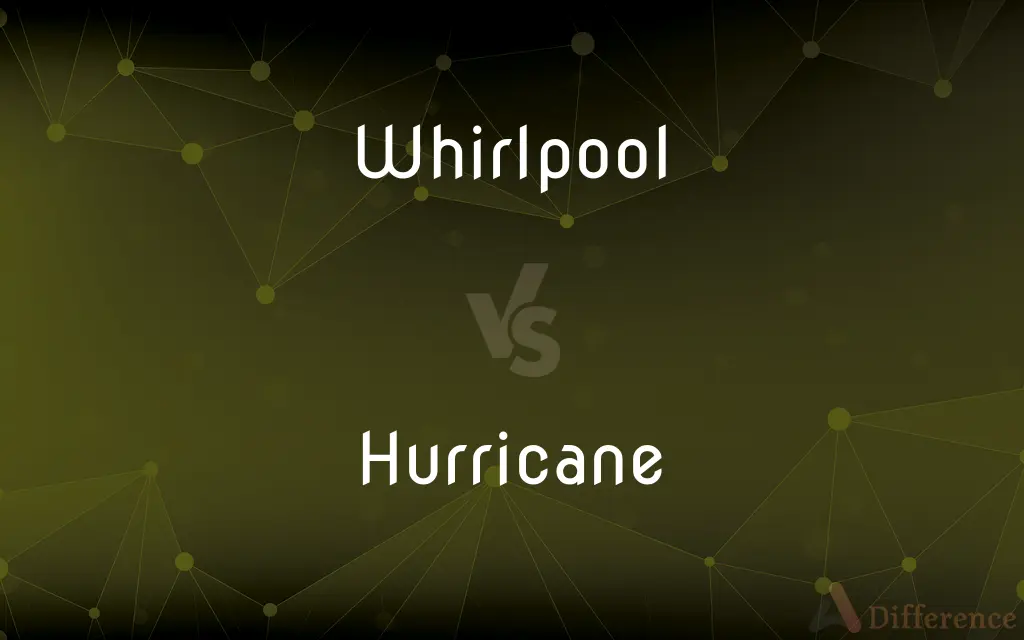Whirlpool vs. Hurricane — What's the Difference?
By Urooj Arif & Fiza Rafique — Updated on March 19, 2024
A whirlpool is a water vortex, while a hurricane is a powerful storm system.

Difference Between Whirlpool and Hurricane
Table of Contents
ADVERTISEMENT
Key Differences
Whirlpools form when opposing currents meet, creating a spinning motion in the water. This phenomenon can range from small, harmless swirls to large, dangerous vortices capable of sinking ships. Hurricanes, on the other hand, are massive storm systems that originate over warm ocean waters, characterized by strong winds, heavy rain, and thunderstorms.
While whirlpools are localized water events affecting navigational safety, hurricanes are vast atmospheric phenomena impacting large geographical areas with wind, rain, and potential destruction. Whirlpools are primarily influenced by water currents and topography, whereas hurricanes are driven by heat energy from warm ocean waters and atmospheric conditions.
The scale and impact of whirlpools and hurricanes differ significantly; whirlpools can pose a threat to vessels in specific areas, while hurricanes can cause widespread devastation, including property damage, flooding, and loss of life. Whirlpools are a natural occurrence in water bodies and can be predictable in certain locations, while hurricanes, although seasonal and trackable, vary in intensity and path, making them less predictable.
Understanding the dynamics of whirlpools helps in navigating waterways, whereas monitoring hurricanes is crucial for preparedness and mitigation of their potential impact on affected regions. Both phenomena demonstrate the power of nature, but in different elements and with distinct implications for human activity.
Comparison Chart
Nature
Water vortex
Atmospheric storm system
ADVERTISEMENT
Formation
By opposing currents in water
Over warm ocean waters due to atmospheric conditions
Impact Area
Localized in water bodies
Large geographical areas
Main Hazard
Navigational danger for vessels
Wind damage, flooding, storm surges
Scale
Can range from small swirls to large vortices
Massive, with extensive wind fields and rain
Predictability
Often predictable in specific locations
Seasonal but varies in path and intensity
Compare with Definitions
Whirlpool
A spinning motion in water caused by opposing currents.
Sailors navigated carefully to avoid the known whirlpool in the strait.
Hurricane
A powerful tropical storm with strong winds.
The hurricane caused widespread devastation across the coastal region.
Whirlpool
Can range in size and intensity.
The small whirlpool by the riverbank posed no threat to the children playing nearby.
Hurricane
Originates over warm ocean waters.
The hurricane formed over the warm waters of the tropical Atlantic.
Whirlpool
Specific and localized phenomena.
The legendary Corryvreckan whirlpool attracts curious adventurers and researchers.
Hurricane
Characterized by a well-defined eye, surrounded by thunderstorms.
The hurricane's eye was clearly visible from the satellite images.
Whirlpool
Poses risks primarily to water navigation.
The captain adjusted the course to steer clear of the whirlpool area.
Hurricane
Can lead to severe wind damage and flooding.
The hurricane's storm surge inundated the town, causing extensive flood damage.
Whirlpool
Influenced by water currents and topography.
The unique underwater topography contributed to the whirlpool's formation.
Hurricane
Tracked and studied for preparedness.
Meteorologists monitored the hurricane's path to provide timely warnings to affected areas.
Whirlpool
A rapidly rotating current of water; a vortex.
Hurricane
A severe tropical cyclone having winds greater than 64 knots (74 miles per hour; 119 kilometers per hour), originating in the equatorial regions of the Atlantic Ocean or Caribbean Sea or eastern regions of the Pacific Ocean, traveling north, northwest, or northeast from its point of origin, and usually involving heavy rains.
Whirlpool
A whirlpool is a body of rotating water produced by opposing currents or a current running into an obstacle. Small whirlpools form when a bath or a sink is draining.
Hurricane
A wind with a speed greater than 64 knots (74 miles per hour; 119 kilometers per hour per hour), according to the Beaufort scale.
Whirlpool
Something, such as a situation, that is confusing or tumultuous and is easy to be drawn into or difficult to get out of
Was sucked into a whirlpool of despair.
Hurricane
Something resembling a hurricane in force or speed.
Whirlpool
A bathtub or pool having jets of warm water that can be directed toward a body part as for therapeutic purposes.
Hurricane
A severe tropical cyclone in the North Atlantic Ocean, Caribbean Sea, Gulf of Mexico, or in the eastern North Pacific off the west coast of Mexico, with winds of 119 km/h (74 miles per hour) or greater accompanied by rain, lightning, and thunder that sometimes moves into temperate latitudes.
Whirlpool
A swirling body of water.
A whirlpool is an instance of a vortex produced by ocean tides, or by a hole underneath where the water would drain out, such as in a bathtub.
Hurricane
(meteorology) A wind scale for quite strong wind, stronger than a storm
Whirlpool
A hot tub, jacuzzi.
Hurricane
"full—triple-full—full" – an acrobatic maneuver consisting of three flips and five twists, with one twist on the first flip, three twists on the second flip, one twist on the third flip
Whirlpool
Turmoil, or agitated excitement.
Hurricane
A violent storm, characterized by extreme fury and sudden changes of the wind, and generally accompanied by rain, thunder, and lightning; - especially prevalent in the East and West Indies. Also used figuratively.
Like the smoke in a hurricane whirl'd.
Each guilty thought to me isA dreadful hurricane.
Whirlpool
(intransitive) To spin or swirl like the water in a whirlpool.
Hurricane
A severe tropical cyclone usually with heavy rains and winds moving a 73-136 knots (12 on the Beaufort scale)
Whirlpool
An eddy or vortex of water; a place in a body of water where the water moves round in a circle so as to produce a depression or cavity in the center, into which floating objects may be drawn; any body of water having a more or less circular motion caused by its flowing in an irregular channel, by the coming together of opposing currents, or the like.
Whirlpool
A sea monster of the whale kind.
The Indian Sea breedeth the most and the biggest fishes that are; among which the whales and whirlpools, called "balænæ," take up in length as much as four . . . arpents of land.
Whirlpool
A powerful circular current of water (usually the resulting of conflicting tides)
Whirlpool
Flow in a circular current, of liquids
Common Curiosities
What creates a whirlpool?
A whirlpool is created when opposing water currents meet, causing water to spin around a central point.
What are the main dangers of hurricanes?
The main dangers of hurricanes include high winds, heavy rainfall leading to flooding, storm surges, and sometimes tornadoes.
Are whirlpools predictable?
Some whirlpools are predictable and occur regularly in known locations, due to specific water currents and topographical features.
Can whirlpools sink ships?
Large, powerful whirlpools can potentially sink ships by creating a downward force and turbulent waters that can capsize or pull vessels under.
How does a hurricane form?
A hurricane forms over warm ocean waters when warm moist air rises, creating an area of low pressure beneath, leading to a cycle of air movement that develops into a storm.
Can hurricanes create whirlpools?
While hurricanes themselves don't create whirlpools, the turbulent waters caused by hurricane-strength winds and storm surges can result in whirl-like motions in water.
What's the difference in scale between whirlpools and hurricanes?
Whirlpools are localized water phenomena, while hurricanes are vast atmospheric systems that can affect entire regions or countries.
How can hurricanes be tracked?
Hurricanes can be tracked using satellite imagery, weather radars, and hurricane hunter aircraft to monitor their path, intensity, and potential landfall.
What measures can mitigate hurricane damage?
Mitigation measures include building to hurricane-resistant standards, creating barriers like sea walls, and having effective evacuation and emergency response plans.
How do whirlpools and hurricanes impact human activity?
Whirlpools can affect navigational safety in specific water bodies, while hurricanes can cause widespread destruction, necessitating preparedness and recovery efforts.
Share Your Discovery

Previous Comparison
Instill vs. Distill
Next Comparison
Biped vs. QuadrupedAuthor Spotlight
Written by
Urooj ArifUrooj is a skilled content writer at Ask Difference, known for her exceptional ability to simplify complex topics into engaging and informative content. With a passion for research and a flair for clear, concise writing, she consistently delivers articles that resonate with our diverse audience.
Co-written by
Fiza RafiqueFiza Rafique is a skilled content writer at AskDifference.com, where she meticulously refines and enhances written pieces. Drawing from her vast editorial expertise, Fiza ensures clarity, accuracy, and precision in every article. Passionate about language, she continually seeks to elevate the quality of content for readers worldwide.














































